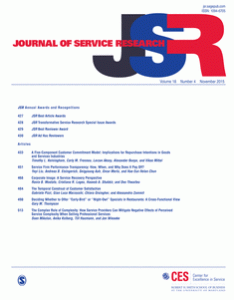How Do Customers and Companies Benefit from Service Firm Transparency?
 [We’re pleased to welcome Andreas B. Eisengerich, who collaborated with Omar Merlo, Seigyoung Auh, and Hae Eun Helen Chun on their paper “Service Firm Performance Transparency: How, When and Why Does It Pay Off?” from the May issue of Journal of Service Research.]
[We’re pleased to welcome Andreas B. Eisengerich, who collaborated with Omar Merlo, Seigyoung Auh, and Hae Eun Helen Chun on their paper “Service Firm Performance Transparency: How, When and Why Does It Pay Off?” from the May issue of Journal of Service Research.]
Calls for greater business transparency have become louder in recent years and transparency has risen to the top of the agenda of many organizations. Businesses in a wide range of industries have started to embrace transparency, as their managers swear by the benefits of providing accessible and objective information to customers. Yet, many firms remain wary of the benefits of transparency and are unsure about how to implement it. How does transparency impact customers’ relationships with a firm? Is being transparent worth the risk? In our research, we focus on one particular aspect of firm transparency, which we deem particularly important to customers and firms. We term it performance transparency, and it reflects the extent to which customers view the information provided by businesses about their service performance as accessible and objective. We find that performance transparency benefits both customers and the firm. Customers benefit because when service quality is difficult to evaluate prior to a purchase, transparency can enable customers to minimize uncertainty by “seeing through” the firm and its offerings. Companies benefit because in a context where it is increasingly more difficult to conceal negative information about a firm’s performance, transparency can actually be used as a source of competitive advantage that increases a customer’s purchase intention and reduces price sensitivity. Surprisingly, we also find that being transparent best impacts companies that tend perhaps to be the most afraid of transparency.
You can read “Service Firm Performance Transparency: How, When and Why Does It Pay Off?” from Journal of Service Research by clicking here. Want to know about all the latest news and research from Journal of Service Research? Just click here to sign up for e-alerts!
Yeyi Liu is an Assistant Professor at Leeds Business School. He holds a BSc in Industrial Engineering and MSc in Management Science and Engineering from Xi’an Jiaotong University, China. He also holds a PhD from Imperial College London. Prior to joining Leeds University Business School, he worked as research associate at Strathclyde University Business School.
Andreas B. Eisingerich is an Associate Professor of marketing at Imperial College Business School, Imperial College London. He earned his PhD at the University of Cambridge and worked at the Center for Global Innovation at the University of Southern California, Marshall School of Business. He has published on customer-brand relationships, customer engagement, and service management in the Journal of Consumer Psychology, Journal of Marketing, Journal of Service Research, Journal of Business Research, Harvard Business Review, and MIT Sloan Management Review, among others.
Seigyoung Auh is an Associate Professor of global marketing at Thunderbird School of Global Management. He earned his MBA and PhD from The Ross Business School, University of Michigan. He is also a research fellow at the Center for Marketing and Public Policy Research, Villanova University. His research interests are in knowledge sharing in sales teams, effect of leadership on extra-role behavior of frontline service employees, and customer orientation diversity. He has published articles in various outlets, including Journal of Service Research, Journal of the Academy of Marketing Science, Journal of Consumer Psychology, International Journal of Research in Marketing, Journal of Retailing, Journal of Product Innovation Management, Marketing Letters, Journal of Personal Selling & Sales Management, Journal of Business Research, and Industrial Marketing Management, among others.
Omar Merlo is an Assistant Professor of marketing at Imperial College Business School, Imperial College London. He earned his PhD from University of Melbourne, Australia. As a consultant and executive educator, he works with numerous service organizations around the world. His main research interests are in strategic marketing, marketing’s role within the firm, firm orientations, and service management. His research has appeared in journals such as Journal of Service Research, Industrial Marketing Management, Marketing Letters, Journal of Business Research, European Journal of Marketing, MIT Sloan Management Review, and Marketing Theory, among others.
Hae Eun Helen Chun is an Assistant Professor of marketing at Cornell School of Hotel Administration. Helen earned her PhD in business administration (marketing) from the Marshall School of Business at University of Southern California. Her research interests include consumer experience management in the service context, with a focus on the role of consumer emotions, anticipation, memory, and sensory marketing. Her research has appeared in journals such as Journal of Consumer Psychology, Sensory Marketing, and Foundations and Trends in Marketing, among others.































































































